Publications on Disarmament
The information below links to selected websites. As an information-sharing platform, we are always searching for new content. Requests for consideration to add links to this webpage should be made to unoda-web [at] un.org
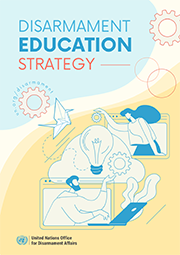
Disarmament Education Strategy
The UNODA Disarmament Education Strategy provides a common framework for the Office’s disarmament education efforts. It aims at enhancing coordination and coherence across various UNODA educational activities, diversifying partnerships and audiences reached, and fostering more sustainable and impactful initiatives.
Go to website
The Last Cherry Blossom
Author, Kathleen Burkinshaw’s award-winning, historical fiction, The Last Cherry Blossom (Sky Pony Press, 2016), is about a young girl and her family living in Hiroshima during the last year of WWII. It is based on events in her mother’s life and it’s through her 12-year-old eyes that readers witness the horror of the world’s first atomic bomb. The Last Cherry Blossom is also written with information on the culture, mindset, and daily life during WWII before the atomic bomb-something that has rarely been touched on before.
Go to website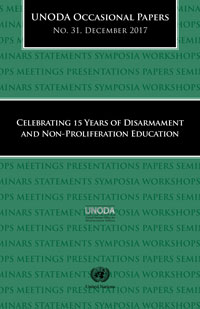
UNODA Occasional Paper n°31: “Celebrating 15 years of disarmament and non-proliferation education”
This edition of the Occasional Paper celebrates the fifteenth anniversary of the United Nations Study on Disarmament and Non-Proliferation Education, which was presented to the United Nations General Assembly in 2002 (A/57/124). It contains contributions from experts from around the world, which showcase fresh perspectives, new ideas and innovations in disarmament and non-proliferation education. The Foreword of the publication is written by Jan Eliasson, Chairman of the Stockholm International Peace Research Institute Governing Board and Former Deputy Secretary-General of the United Nations.
Go to website
OPANAL’s International Seminar: “A world free of nuclear weapons: is it possible? is it desirable? how could it be achieved? An exchange of views by some leading experts”
On 13 February 2017, a few weeks before the negotiations of the Treaty on the Prohibition of Nuclear Weapons at the United Nations, the Agency for the Prohibition of Nuclear Weapons in Latin America and the Caribbean (OPANAL) held an International Seminar on the question of nuclear weapons. The Seminar was organized in two panels. The first panel considered the current strategic context at a global level which is closely linked to nuclear weapons. The second panel dealt with nuclear disarmament in its various aspects. Twelve renowned experts from twelve different countries participated, including Dr. William J. Perry, former Secretary of Defence of the United States and Ms. Beatrice Fihn, Executive Director of the International Campaign to Abolish Nuclear Weapons (ICAN) that was awarded the Nobel Peace Prize this year. The twelve panelists brought a broad range of views; some of them in favor of nuclear weapons as a means of security and others in favor of the prohibition and elimination of those weapons. The Seminar included high-level officials such as the Director General of the Department of Arms Control and Disarmament of the People’s Republic of China, as well as world-renowned scholars that participated in the debates.
Go to website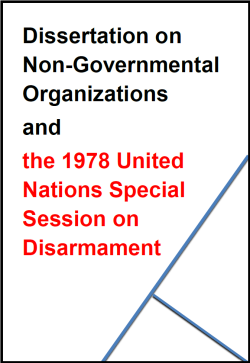
Dissertation on Non-Governmental Organizations and the 1978 United Nations Special Session on Disarmament
Written by David Atwood in 1982 as his thesis for his doctoral degree (1982) from the University of North Carolina and donated to the United Nations. Though recently retired, Dr. Atwood has been Chair of the Acronym Institute and on its Board since 2006. From 2004 to 2011 he served as Director of the Quaker United Nations Office (QUNO) Geneva and from 1995–2011 as QUNO's Disarmament and Representative. He holds a Ph.D. Political Science from the University of North Carolina. He is a co-founder of the Geneva Forum and the Geneva Peacebuilding Platform. Dr Atwood served as Senior Advisor to the Small Arms Survey in Geneva from 2011 to 2015. He was the General Secretary of the International Fellowship of Reconciliation (1988–1994).
Go to website
Resource Guide on Nuclear Disarmament for Religious Leaders and Communities
This Resource Guide for Religious Leaders and Communities, published by Religions for Peace, provides practical examples of nuclear disarmament actions by religious communities, as well as appropriate information and resources to support faith-based and interfaith reflection and action. The Resource Guide highlights common values of all major religious faiths that are applicable to the threat of nuclear weapons. It focuses on the special roles of religious believers, including women and youth, and the positive actions they can take to break down the walls of nuclear terror and build cooperative human security for a nuclear weapon free world.
Download PDF
Five Myths About Nuclear Weapons
Five Myths About Nuclear Weapons by Ward Wilson, a senior fellow at the British American Security Information Council (BASIC), is a ground-breaking exposition of the pragmatic reasons why nuclear weapons are both not very good weapons and very dangerous weapons. The moral arguments against nuclear weapons have never been in doubt. The question has always been whether necessity overrode moral qualms. Five Myths About Nuclear Weapons destroys the most popular reasons for keeping nuclear weapons.
Go to website
Action for Disarmament: 10 things you can do!
In collaboration with the UN Department of Public Information, the UN Office for Disarmament Affairs has launched a publication entitled "Action for Disarmament: 10 things you can do!". The book is written for secondary school and first-years university students and aims to draw the attention of young people around the world to the promotion of international peace and security through disarmament. It offers 10 practical steps to help young people mobilize, act and promote the disarmament ideals of the United Nations throughout their schools, their communities and beyond.
Go to website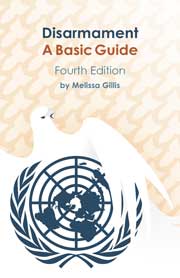
Disarmament: A Basic Guide
Why is disarmament important? Global Arms Expenditures, Nuclear Weapons, the Nuclear Non-Proliferation Treaty, Chemical Weapons, Biological Weapons, etc. Published by the Office for Disarmament Affairs, this guide explains basic disarmament issues in terms that adults as well as high school students can understand.
Download PDF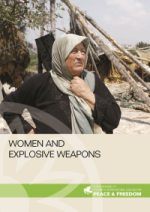
Women and Explosive Weapons
The report by the Reaching Critical Will of the Women's International League for Peace and Freedom seeks to draw attention to some of the unique impacts on women that explosive weapons have when used in populated areas. It describes explosive weapons and the legal tools available to assess their use, focusing in particular on legal documents that support greater inclusion of gender analysis and women's participation. It also gives an overview on how explosive weapons specifically affect women and why a gendered analysis of the impact of explosive weapons use in populated areas is needed.
Go to website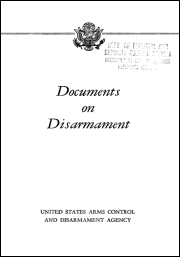
Documents on Disarmament
The United Nations Office for Disarmament (and its predecessors) has long had among its priorities the promotion of disarmament education, training, and research. Though disarmament efforts have a long history, many primary documents are not easily accessible on the internet or indeed are not available at all. One of the most valuable single resources for historical research in this field is found in the series of publications called Documents on Disarmament, published by the former U.S. Arms Control and Disarmament Agency. This multi-volume series remains a unique and indispensable resource for undertaking historical research on disarmament. It covers the years 1945 through 1986 (the series is missing two volumes) and includes material dealing both with all weapons of mass destruction as well as conventional arms. We have scanned our entire holdings of these volumes and made them available, for the first time, in searchable, digital format. While the original volumes are rapidly disappearing or are physically deteriorating and in very limited supply, this collection will now be a permanent resource available to the entire world. The Office for Disarmament Affairs hopes it will contribute to the advancement of knowledge about disarmament, which will in turn help to advance disarmament itself.
Go to website
PGA Parliamentary Handbook
Parliamentarians have a unique and fundamental role to play in promoting signature, ratification and implementation of the Arms Trade Treaty (ATT). The purpose of this Parliamentary Handbook is to highlight – in a clear and straightforward manner – the many different, but equally important ways in which Parliamentarians can act and decisively place the ATT on a continued, positive future trajectory Members of Parliament (MPs) around the world will hopefully find this Handbook to be a useful reference source in the many, distinct advocacy and lawmaking initiatives that they undertake to achieve universality of the ATT.
Download PDF
Unspeakable Suffering
This publication examines the humanitarian impact of nuclear weapons and is aimed for civil society actors, academics and governments that are interested in approaching weapons negotiations with a humanitarian lens.
Download PDF
1540 Compass
The UN Office for Disarmament Affairs is cooperating with the Center for International Trade and Security (CITS) at the University of Georgia on the publication of an electronic journal, the "1540 Compass." The new journal offers a platform for sharing experience in implementing Security Council resolution 1540 (2004), which calls upon States to adopt and enforce effective measures to address the threat posed by the proliferation of nuclear, chemical and biological weapons, as well as their means of delivery, to prevent non-State actors from gaining access to such items or materials. The 1540 Compass also establishes an interactive forum for advancing and discussing ideas which could assist the international community to bolster existing cooperation and forging new partnerships in promoting the implementation of the resolution.
Go to website
Assuring Destruction Forever: Nuclear Weapon Modernization Around the World
This publication contains research and in-depth analysis by leading non-governmental experts and researchers on the plans of nuclear weapon modernization by China, France, India, Israel, Pakistan, Russia, the United Kingdom, and the United States. It also analyzes the costs of nuclear weapons in the context of the economic crisis, austerity measures, and rising challenges in meeting human and environmental needs. Combined, the nuclear weapon possessors have spent approximately one hundred billion USD on their nuclear programmes.
Download PDF
Nuclear Famine Report
The number of people threatened by nuclear-war induced famine would be well over one billion. The studies in this report from International Physicians for the Prevention of Nuclear War and Physicians for Social Responsibility demonstrate the need for additional research and underscore the urgent need to move with all possible speed to the negotiation of a nuclear weapons convention that will eliminate the danger of nuclear war.
Download PDF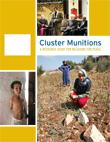
Cluster Munitions: A Resource Guide for Religions for Peace
This resource guide was created by Religions for Peace to raise awareness about cluster munitions and their effects, and provide suggestions for how religious leaders can advocate for change and provide unique support for survivors and their communities. While it targets faith-based organizations and religious leaders, much of the information can be useful to other groups. Religions for Peace is a member of the Cluster Munition Coalition (CMC) a global network of nearly 200 civil society organisations, including NGOs, faith-based groups and professional associations.
Download PDF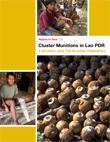
Cluster Munitions in Lao PDR
This resource guide highlights the specific impact of cluster bombs in Lao, PDR, which is widely considered to be the most bombed country, per capita, in the world but was also the host of the First Meeting of States Parties to the Convention on Cluster Munitions in 2010.
Download PDF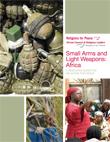
Small Arms and Light Weapons: Africa
This resource guide is designed for religious leaders, communities and organizations at all levels to better understand and respond to the many problems posed by small arms and light weapons, as well as the issues that fuel their use and trade. Developed by Religions for Peace, it is meant to put this issue in the context of other problems and show that in addressing some of the challenges that small arms pose, stakeholders can also have a broader positive impact. Though this resource guide focuses on Africa, many elements of the manual will be useful to other regions of the world.
Download PDF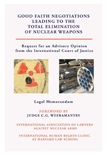
Good Faith Negotiations Leading to the Total Elimination of Nuclear Weapons
Request for an Advisory Opinion from the International Court of Justice. The International Court of Justice (ICJ or the Court) in 1996 determined that the key to overcoming the risks posed by nuclear weapons is the legal obligation to negotiate disarmament in good faith. In spite of the Court's finding, states have made little progress for more than a decade towards fulfilling that obligation. States have also had strongly opposing views of what they are required to do. High-level voices have noted the lack of progress and, stressing the urgency of the situation, called for renewed efforts to achieve a nuclear weapon-free world.
Download PDF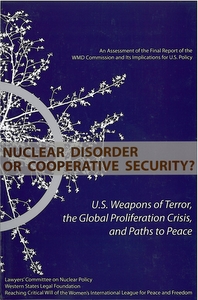
Nuclear Disorder or Cooperative Security?
Global norms and treaty regimes play an indispensable role in controlling and eliminating nuclear, biological, and chemical (NBC) weapons. The possession and use of biological and chemical weapons is prohibited by the Biological Weapons Convention and Chemical Weapons Convention. For almost all states, the possession of nuclear weapons is prohibited by the Nuclear Non-Proliferation Treaty (NPT), and their use is at least generally prohibited by international law as set forth by the International Court of Justice. The regimes give institutional life to the norms through regular meetings of states in review processes, and through implementing agencies engaged in monitoring compliance.
Go to website
Beyond Arms Control: Challenges and Choices for Nuclear Disarmament
This collaborative work of non-governmental researchers and activists critically examines the mainstream discourse of nuclear weapons. The book explores some of the most important challenges that governments and civil society will face at the 2010 NPT Review Conference and beyond, highlighting the prospects and pitfalls for nuclear disarmament in the current world order. Throughout, the authors demonstrate that nuclear disarmament must be pursued in the context of a broader movement for social and economic justice and equality.
Go to website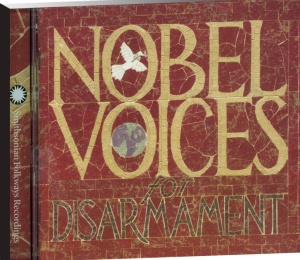
Nobel Voices for Disarmament: 1901-2001 (Audio CD)
Narrated by Michael Douglas, United Nations Messenger of Peace This was a collaborative production of the United Nations and Smithsonian Folkways Recordings. 39 tracks, 67 minutes, accompanied by a 28-page booklet. Released 26 August 2008
Download PDF
Peace and Disarmament Education: Changing Mindsets to Reduce Violence and Sustain the Removal of Small Arms
This book represents the work of and the lessons learned from a partnership with Albania, Cambodia, Niger and Peru based on a two-year collaboration between the United Nations and the Hague Appeal for Peace. Its aim is to promote peace and disarmament education into school curricula and communities.
Download PDF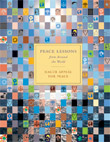
Peace Lessons from Around the World
Peace education is a comprehensive and holistic participatory process that includes teaching and learning for and about human rights, non-violence, social and economic justice, gender equality, environmental sustainability, disarmament, international law, human security and traditional peace practices.
Go to website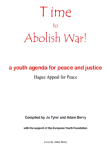
Time to Abolish War: Youth Manual created by Youth for Youth
This youth created, youth oriented publication looks to achieve this objective through peace campaigns focusing on issues including landmines, small arms, peace education, promoting children''s rights, stopping the use of child soldiers, and abolishing nuclear weapons.
Download PDF